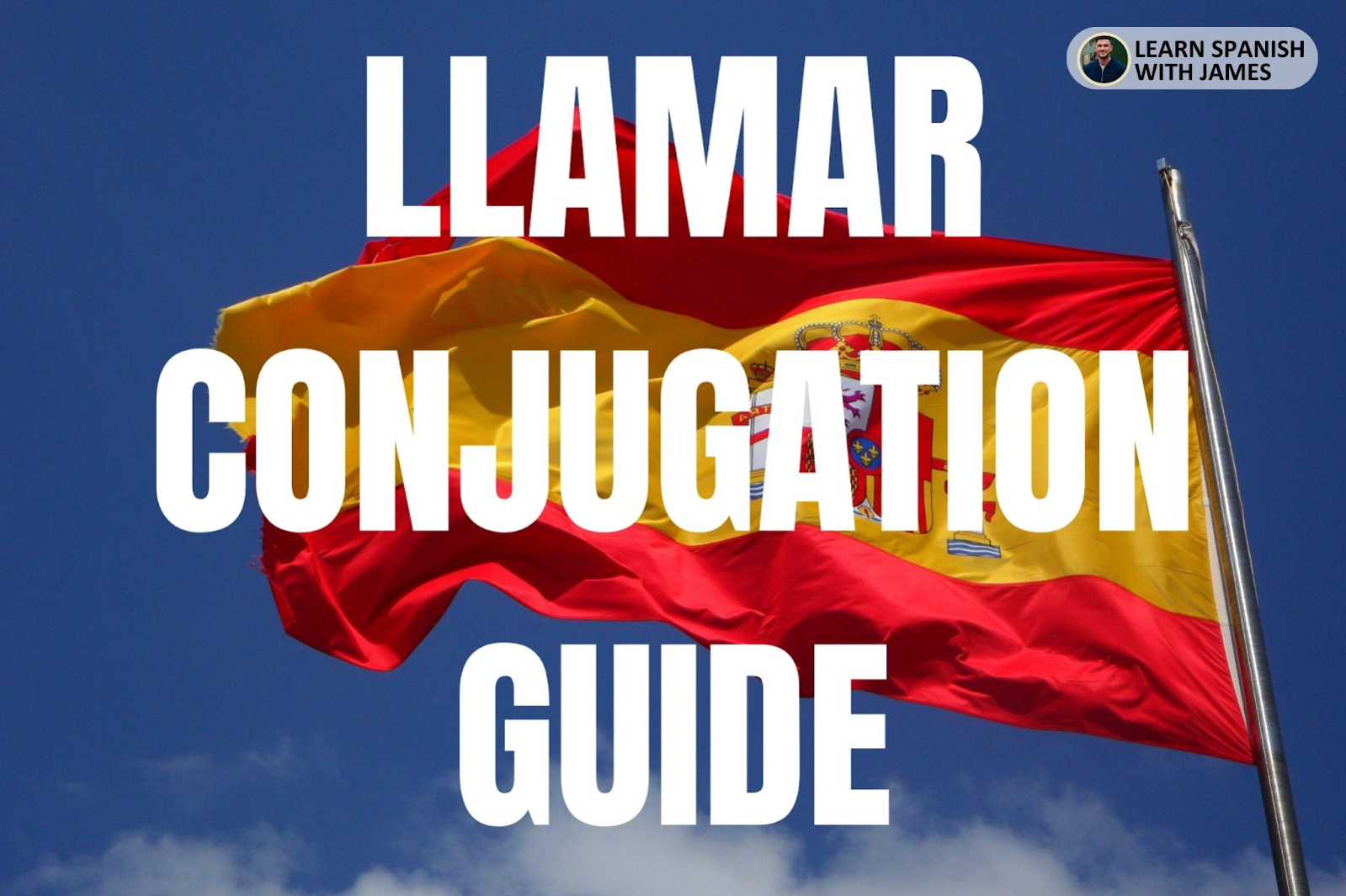Llamar Conjugation Chart & Full Tense Guide

This guide will teach you how to conjugate the Spanish verb “llamar”, meaning “to call”.
“Llamar” is a regular verb that follows specific patterns in its conjugation, making it an excellent candidate for study if you want to learn how to conjugate any regular -AR verb.
I’m James, from Learn Spanish With James. Throughout this guide, you’ll learn all “llamar” conjugations in multiple tenses and contexts.
Whether you’re new to Spanish verb conjugation or seeking to brush up on your grammar skills, this guide will help you to learn every “llamar” conjugation.
Note that “llamar” is not to be confused with “llamarse”, which means to call oneself. It is from “llamarse” that we get the common term “me llamo” – quite literally, “I call myself”.
If you want to know why they differ in meaning, check out my guide to reflexive verbs in Spanish.
Present Tense
Pronouns Pronombres
I yo llamo
you tú llamas
he,she,it, you(formal) él,ella,usted llama
we nosotros,nosotras llamamos
you pl. vosotros, vosotras llamáis
they, you pl. (formal) ellos,ellas,ustedes llaman
When we use the Present Tense
The present tense in Spanish indicates an action that is currently happening, an ongoing action (in some cases), or a general truth.
In the case of the Spanish verb “llamar,” we use it to say that we are calling someone or something right now, or that we always call someone or something as a general habit.
I have provided some examples of this below.
Examples of “Llamar” in the Present Tense
- Yo llamo a mi madre cada día. (I call my mother every day.)
- Tú llamas a la policía. (You call the police.)
- Él/Ella llama a su amigo. (He/She calls his/her friend.)
- Nosotros llamamos al restaurante para hacer una reserva. (We call the restaurant to make a reservation.)
- Vosotros llamáis a vuestra abuela. (You call your grandmother.)
- Ellos/Ellas llaman a su profesor para pedir ayuda. (They call their teacher for help.)
Preterite Tense
Pronouns Pronombres
I yo llamé
you tú llamaste
he, she. it, you (formal) él, ella, usted llamó
we nosotros, nosotras llamamos
you (plural) vosotros, vosotras llamasteis
they, you (pl. formal) ellos, ellas, ustedes llamaron
When we use the Preterite Tense
The preterite tense in Spanish is used to describe completed actions in the past. It’s often used for actions that have a specific beginning and end.
As you will see from the “llamar” preterite tense conjugation chart above, all conjugations are regular.
Take note that the fourth person (we) – “llamamos” is the same in the preterite tense as the present.
Examples of the Verb “Llamar” in the Preterite Tense
- Yo llamé a mi amigo ayer. (I called my friend yesterday.)
- Tú llamaste a la puerta varias veces. (You knocked on the door several times.)
- Él/Ella llamó a su madre para decirle que llegaba tarde. (He/She called his/her mother to tell her he/she was going to be late.)
- Nosotros llamamos a a la ambulancia. (We called the ambulance.)
- Vosotros llamasteis a la ambulancia después del accidente. (You called the ambulance after the accident.)
- Ellos/Ellas llamaron a sus abuelos para invitarlos a cenar. (They called their grandparents to invite them for dinner.)
Imperfect Tense
Pronouns Pronombres
I yo llamaba
you tú llamabas
he, she, it, you (formal) él, ella, usted llamaba
we nosotros, nosotras llamábamos
you (plural) vosotros, vosotras llamabais
they, you(pl. formal) ellos, ellas, ustedes llamaban
When we use the Imperfect Tense
The imperfect tense in Spanish is used to describe ongoing or habitual actions in the past, as well as to provide background information.
With “llamar”, the imperfect tense translates to “used to call” and “was calling”.
As I state in all grammar guides on this site, it is important not to confuse the imperfect tense with the preterite tense, which means “called”.
A great way to remember the differences is to try to use both the imperfect tense and the preterite tense in the same sentence.
Examples of the Imperfect Tense “Llamar” Conjugation
- Yo llamaba a mi hermana todos los días. (I used to call my sister every day.)
- Tú llamabas a tu perro por su nombre. (You used to call your dog by its name.)
- Él/Ella llamaba a su madre antes de dormir. (He/She used to call his/her mother before going to bed.)
- Nosotros llamábamos a nuestros amigos para jugar. (We used to call our friends to play.)
- Vosotros llamabais a la puerta suavemente para no despertar a nadie. (You used to knock on the door softly so as not to wake anyone.)
- Ellos/Ellas llamaban a sus hijos para cenar. (They used to call their children for dinner.)
Future Tense
Pronouns Pronombres
I yo llamaré
you tú llamarás
he,she,it, you(formal) él,ella,usted llamará
we nosotros,nosotras llamaremos
you pl. vosotros, vosotras llamaréis
they, you pl. (formal) ellos,ellas,ustedes llamarán
When we use the Future Tense
The future tense in Spanish is used to express actions that will happen in the future.
This tense is particularly useful for discussing future plans, intentions, or predictions.
You would use “llamar” in the future tense to say that you will call someone immeditately or soon.
As with all regular verbs, the future tense follows a specific conjugation pattern and is very easy to learn.
You just need to memorize the endings, which go after the full infinitive form, and try to use them in context whenever possible.
Examples of the Spanish Verb “Llamar” in the Future Tense
- Yo llamaré a mi novio cuando llegue a casa. (I will call my boyfriend when I get home.)
- Tú llamarás a tu jefe para avisarle que llegarás tarde. (You will call your boss to let him know you’ll be late.)
- Él/Ella llamará a la empresa para solicitar información. (He/She will call the company to request information.)
- Nosotros llamaremos a nuestros familiares para invitarlos a la fiesta. (We will call our relatives to invite them to the party.)
- Vosotros llamaréis a la policía si es necesario. (You will call the police if necessary.)
- Ellos/Ellas llamarán a sus amigos para organizar una salida. (They will call their friends to organize an outing.)
Conditional Tense
Pronouns Pronombres
I yo llamaría
you tú llamarías
he,she,it, you(formal) él,ella,usted llamaría
we nosotros,nosotras llamaríamos
you pl. vosotros, vosotras llamaríais
they, you pl. (formal) ellos,ellas,ustedes llamarían
When we use the Conditional Tense
The conditional tense in Spanish is used to express actions that would happen under certain conditions or to convey a polite request or suggestion.
When using “llamar” in the conditional tense, we say that we “would” call someone.
Top Tip: Try to use the conditional tense with the imperfect subjunctive in the same sentence if you can. Doing so will help you to score high marks in any speaking exam.
Examples of “Llamar” in the Conditional Tense
- Yo llamaría a mi abuela si tuviera tiempo. (I would call my grandmother if I had time.)
- Tú llamarías a la puerta antes de entrar. (You would knock on the door before entering.)
- Él/Ella llamaría al servicio técnico si el televisor se estropeara. (He/She would call customer service if the TV broke.)
- Nosotros llamaríamos a un taxi si lloviera. (We would call a taxi if it rained.)
- Vosotros llamaríais a la profesora para preguntarle sobre la tarea. (You would call the teacher to ask about the homework.)
- Ellos/Ellas llamarían a sus amigos si necesitaran ayuda. (They would call their friends if they needed help.)
Perfect Tense
Pronouns Pronombres Auxiliary verb ‘haber’
I yo he llamado
you tú has llamado
he,she,it, you(formal) él,ella,usted ha llamado
we nosotros,nosotras hemos llamado
you pl. vosotros, vosotras habéis llamado
they, you pl. (formal) ellos,ellas,ustedes han llamado
When we use the Perfect Tense
The perfect tense in Spanish is used to describe actions that have been completed recently or that have a connection to the present.
So, “llamar” in the perfect tense means “have called”.
In order to use the perfect tense, you need to conjugate the auxilary verb “haber” – which means “to have” – and use the past participle of the inifintive “llamar”.
This becomes “llamado”.
Top Tip: Try to learn all “haber” conjugations in the perfect tense, the pluperfect tense, the future perfect tense, and the conditional perfect tense. Doing so will open your vocabulary and triple your level of fluency.
Examples of “Llamar” in the Pretérito Perfecto Tense
- Yo he llamado a la policía por el ruido. (I have called the police because of the noise.)
- Tú has llamado a tu madre para contarle la buena noticia. (You have called your mother to tell her the good news.)
- Él/Ella ha llamado al médico para hacer una cita. (He/She has called the doctor to make an appointment.)
- Nosotros hemos llamado a los vecinos para invitarlos a la fiesta. (We have called the neighbors to invite them to the party.)
- Vosotros habéis llamado al fontanero para arreglar la tubería. (You have called the plumber to fix the pipe.)
- Ellos/Ellas han llamado a su amigo para felicitarlo por su cumpleaños. (They have called their friend to congratulate him on his birthday.)
Pluperfect Tense
Pronouns Pronombres Auxiliary verb ‘haber’
I yo había llamado
you tú habías llamado
he,she,it, you(formal) él,ella,usted había llamado
we nosotros,nosotras habíamos llamado
you pl. vosotros, vosotras habíais llamado
they, you pl. (formal) ellos,ellas,ustedes habían llamado
When we use the Pluperfect Tense
The pluperfect tense in Spanish is used to describe actions that had occurred before another past action or time.
It indicates events that had been completed before a specific point in the past.
So, when we use “llamar” in the pluperfect tense, we are saying “had called”.
Top Tip: This is a great tense to learn so that you can combine it with either the preterite tense or the imperfect subjunctive in the same sentence. In the example sentences below, I have shown you how to do this.
Examples of “Llamar” in the Pluperfect Tense
- Yo había llamado a mi madre antes de salir de casa. (I had called my mother before leaving home.)
- Tú habías llamado a la empresa para cancelar la cita. (You had called the company to cancel the appointment.)
- Él/Ella había llamado al servicio de emergencia cuando vio el accidente. (He/She had called emergency services when he/she saw the accident.)
- Nosotros habíamos llamado a la policía antes de que llegara el ladrón. (We had called the police before the thief arrived.)
- Vosotros habíais llamado a la policía antes de que llegara el ladrón. (You had called the police before the thief arrived.)
- Ellos/Ellas habían llamado al vecino para pedirle ayuda. (They had called the neighbor to ask for help.)
Future Perfect Tense
Pronouns Pronombres Auxiliary verb ‘haber’
I yo habré llamado
you tú habrás llamado
he,she,it, you(formal) él,ella,usted habrá llamado
we nosotros,nosotras habremos llamado
you pl. vosotros, vosotras habréis llamado
they, you pl. (formal) ellos,ellas,ustedes habrán llamado
When we use the Future Perfect Tense
The future perfect tense in Spanish is used to describe actions that will have been completed by a certain point in the future.
As with the other aforementioned tenses, we need to use the Spanish verb conjugation of “haber” in order to use the future perfect tense.
We then add the past participle of “llamar” which, as you now know, is “llamado”.
Examples of “Llamar” in the Future Perfect Tense
- Yo habré llamado a mi amigo para entonces. (I will have called my friend by then.)
- Tú habrás llamado a la empresa para confirmar la cita. (You will have called the company to confirm the appointment.)
- Él/Ella habrá llamado al médico antes de la consulta. (He/She will have called the doctor before the appointment.)
- Nosotros habremos llamado a los invitados para recordarles la hora. (We will have called the guests to remind them of the time.)
- Vosotros habréis llamado al cliente para resolver el problema. (You will have called the client to solve the issue.)
- Ellos/Ellas habrán llamado a su abogado para asesorarse. (They will have called their lawyer for advice.)
Conditional Perfect Tense
Pronouns Pronombres Auxiliary verb ‘haber’
I yo habría llamado
you tú habrías llamado
he,she,it, you(formal) él,ella,usted habría llamado
we nosotros,nosotras habríamos llamado
you pl. vosotros, vosotras habríais llamado
they, you pl. (formal) ellos,ellas,ustedes habrían llamado
When we use the Conditional Perfect Tense
The conditional perfect tense in Spanish is used to describe actions that would have been completed under certain conditions.
Again, it is formed with the help of ”haber” and the past participle of “llamar”.
Top Tip: If you want to score high marks in any Spanish speaking exam, practice using the conditional perfect tense with the imperfect subjunctive. This is some seriously high level grammar!
Examples of the Verb “Llamar” in the Conditional Perfect Tense
- Yo habría llamado a la policía si hubiera visto algo sospechoso. (I would have called the police if I had seen anything suspicious.)
- Tú habrías llamado a tu madre si hubieras necesitado ayuda. (You would have called your mother if you had needed help.)
- Él/Ella habría llamado al fontanero si hubiera sabido arreglar la tubería. (He/She would have called the plumber if he/she had known how to fix the pipe.)
- Nosotros habríamos llamado a un mecánico si el coche se hubiera averiado. (We would have called a mechanic if the car had broken down.)
- Vosotros habríais llamado al veterinario si el perro se hubiera puesto enfermo. (You would have called the vet if the dog had gotten sick.)
- Ellos/Ellas habrían llamado a sus padres si hubieran tenido algún problema. (They would have called their parents if they had had any problems.)
Present Subjunctive
Pronouns Pronombres
I yo llame
you tú llames
he,she,it, you(formal) él,ella,usted llame
we nosotros,nosotras llamemos
you pl. vosotros, vosotras llaméis
they, you pl. (formal) ellos,ellas,ustedes llamen
When we use the Present Subjunctive
The present subjunctive mood in Spanish is used to express desires, doubts, wishes, or hypothetical situations, especially when expressing uncertainty or dependence on another circumstance.
As “llamar” is a regular Spanish verb, it is not too difficult to learn the corresponding conjugations in the subjunctive form.
All you need to do is replace the -AR endings with the -ER endings from the second person onwards.
Then, for the first person, replace ‘o’ with ‘e’.
This is the rule for all regular -AR verbs when using the present subjunctive.
Examples of the Verb “Llamar” in the Present Subjunctive
- Es importante que yo llame a mi abuela hoy. (It’s important that I call my grandmother today.)
- No creo que tú llames a la policía sin motivo. (I don’t think you will call the police without reason.)
- Espero que él/ella llame a tiempo para la reunión. (I hope he/she calls on time for the meeting.)
- Dudo que nosotros llamemos a la empresa para quejarnos. (I doubt we will call the company to complain.)
- Ojalá que vosotros llaméis al médico cuanto antes. (I hope you will call the doctor as soon as possible.)
- No creo que ellos/ellas llamen a sus padres para pedir dinero. (I don’t think they will call their parents to ask for money.)
Imperfect Subjunctive Tense
Pronouns Pronombres
I yo llamara
you tú llamaras
he,she,it, you(formal) él,ella,usted llamara
we nosotros,nosotras llamáramos
you pl. vosotros, vosotras llamarais
they, you pl. (formal) ellos,ellas,ustedes llamaran
When we use the Imperfect Subjunctive Tense
The imperfect subjunctive tense in Spanish is used to express desires, doubts, wishes, or hypothetical situations in the past.
It indicates actions that were uncertain, hypothetical, or desired. Remember that we only use this tense in the past or when referring to past actions.
Some examples of this are below.
Examples of the Verb “Llamar” in the Imperfect Subjunctive Tense
- Quería que yo llamara a mi hermana. (He wanted me to call my sister.)
- Dudaba que tú llamaras a tiempo. (He doubted you would call on time.)
- Prefería que su mama llamara antes de llegar. (He wished his mother called before arriving.)
- Esperábamos que nosotros llamáramos a la policía. (We hoped we would call the police.)
- Ojalá que vosotros llamárais al servicio de emergencia. (I hope you would call emergency services.)
- No creía que ellos/ellas llamaran al abogado. (I didn’t believe they would call the lawyer.)
Affirmative Imperative
Pronouns Pronombres
you tú ¡llama!
he,she,it, you(formal) él,ella,usted ¡llame!
we nosotros,nosotras ¡llamemos!
you pl. vosotros, vosotras ¡llamad!
they, you pl. (formal) ellos,ellas,ustedes ¡llamen!
When We Use The Affirmative Imperative
The affirmative imperative in Spanish is used to give commands or instructions in a direct and assertive manner.
When we use “llamar” in the affirmative imperative form, we are telling someone to “call”.
You can also use the imperative to say “let’s” do something.
Examples of The Affirmative Imperative “Llamar” Conjugation
- Llama a la policía ahora mismo. (Call the police right now.)
- Llamad a vuestra madre para avisarle. (Call your mother to let her know.)
- Llame al técnico para arreglar la avería. (Call the technician to fix the breakdown.)
Negative Imperative
Pronouns Pronombres
you tú ¡no llames!
he,she,it, you(formal) él,ella,usted ¡no llame!
we nosotros,nosotras ¡no llamemos!
you pl. vosotros, vosotras ¡no llaméis!
they, you pl. (formal) ellos,ellas,ustedes ¡no llamen!
When We Use The Negative Imperative
The negative imperative in Spanish is used to give commands or instructions in a negative form, often to forbid or discourage someone from doing something.
In order to use the negative imperative, we need to add “no” to the start of the phrase and use the present subjunctive form.
Some examples are below, but be sure to study the verb table above too.
Examples of The Negative Imperative “Llamar” Conjugation
- No llames a tu hermana a estas horas. (Don’t call your sister at this time.)
- No llaméis al vecino para molestarlo. (Don’t call the neighbor to bother him.)
- No llame al jefe si no es urgente. (Don’t call the boss if it’s not urgent.)
Online Spanish Courses & Grammar Courses
For a full list of Beginner, Intermediate and Advanced Courses, check out this full list of online Spanish courses.
I put this list together myself, and it comprises a mixture of courses that offer Spanish grammar practice for all levels, conversational practice, listening and writing exercises in Spanish, free Spanish courses, and a whole lot more.
The fastest way to learn Spanish is to test a mixture of Spanish resources and choose the course that coincides most with your learning style.
In addition to online Spanish courses, on this site you will find a wide range of Spanish podcasts, Spanish apps, Spanish YouTube channels, and both online and physical Spanish language schools.

About James – Or Should that be Santiago?
My name is James. I am a Brit with a love for the Spanish language. I have lived in Spain, Argentina, and Costa Rica, and I have been teaching Spanish for over a decade. This site will show you how to master the elements of Spanish grammar that often dishearten learners. I hope you enjoy the site and find it useful.
If you are interested in taking your Spanish to the next level, check out the Courses section for a full list of the Spanish courses I suggest. All reviews are based on my personal opinions.







